Unlocking opportunities: How Ekiti State, Nigeria is enabling women businesses through better procurement practices
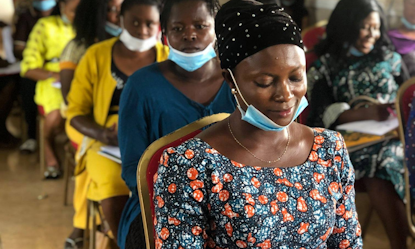
Challenge: Small and women-led businesses dominate the local economy of Ekiti, a small state in southwestern Nigeria. But these businesses rarely take part in public procurement due to long-standing cultural barriers, overly bureaucratic processes and the sense that to win public contracts, they must have the right connections.
Open contracting approach: Supported by OCP’s Lift Impact accelerator program from 2021, Ekiti State’s public procurement agency created better opportunities for small businesses and particularly women-led businesses, to participate in public contracts. The agency consulted women-led business owners, members of civil society, government line agencies, the legislature and the governor’s office to understand what changes were needed and to ensure they were implemented successfully. The public procurement agency improved access to information about upcoming opportunities for women-led and small businesses and conducted training to improve their capacity to respond. The bidding process was also restructured to lower the barriers for such businesses to register and submit bids.
Results: The number of women-led businesses registered in the official state public procurement system increased by 43% from 2021 and 2022 to a total of 158 businesses, winning a total of 47 contracts, up from a mere 7 in 2020. Changes to the public procurement policy manual and guidelines that improve gender-responsive procurement practices were ratified by the State Executive Council and published online. Women trained as part of the program are now more likely to participate in public procurement according to a survey by the procurement agency, with 30% of those surveyed saying they do so, up from 23% before. The procurement agency has now established a dedicated helpdesk and increased the diversity of its planning and evaluation committees in the process and the hope is that the percentages of women-owned businesses participating will rise further as trust and training increases.
The economy of Ekiti, a small state in southwest Nigeria, relies heavily on small businesses. Local entrepreneurs, and particularly women, keep the offices, shops, food stalls, and construction sites running, but there’s one major market from which they’re notably absent: public procurement, which covers some US$95m in 2022.
It’s a “missed opportunity,” says Egghead Odewale, Director General of Ekiti State’s Bureau of Public Procurement (EKBPP). Apart from giving much-needed income to local families who were hit hard by the pandemic, hiring Ekiti businesses for state projects would keep taxpayers’ money circulating in the community longer, Odewale argues. Research shows that women, in particular, tend to re-invest more in their own area. And small, local businesses can generate more customized and creative solutions for residents.
The state government’s vision for public procurement is to have “a more transparent, all-inclusive, efficient, and effective procurement process that supports the participation of small and medium-sized enterprises (SMEs), especially women businesses,” says Odewale. To realize that vision, in 2021, EKBPP joined OCP’s Lift accelerator program. They were one of seven teams selected from more than 100 submissions worldwide. The project set out to build on the state’s existing transparency infrastructure, including an e-procurement portal that publishes structured open data according to the internationally recognized Open Contracting Data Standard (OCDS).
Understanding the needs
The first step for EKBPP was to understand who their providers were. But “gathering information on women businesses already engaged in the state’s contracting was a challenge,” says Egghead.
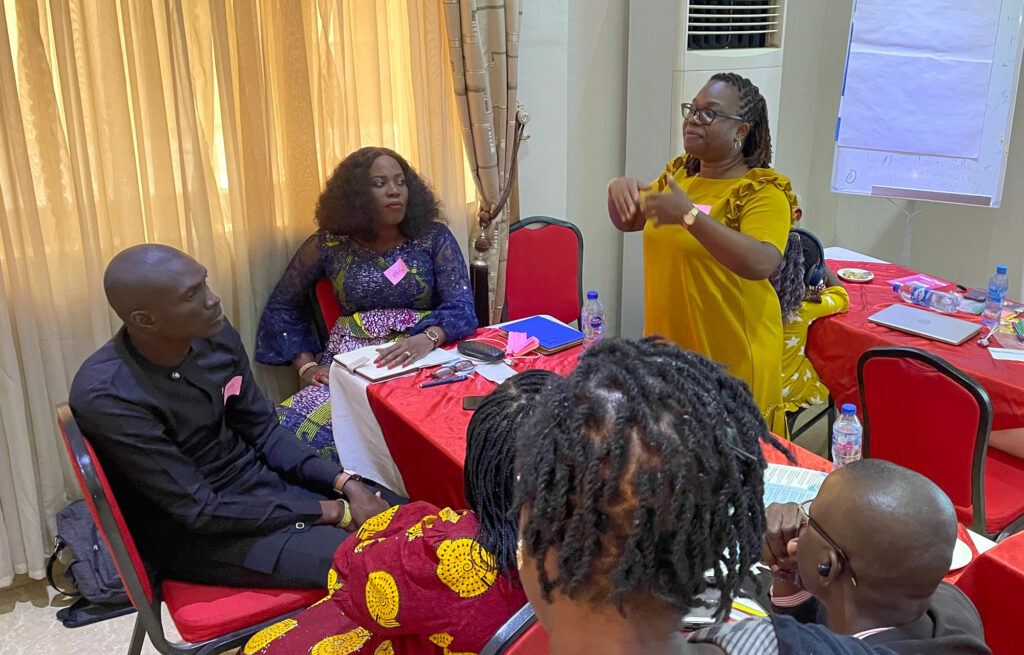
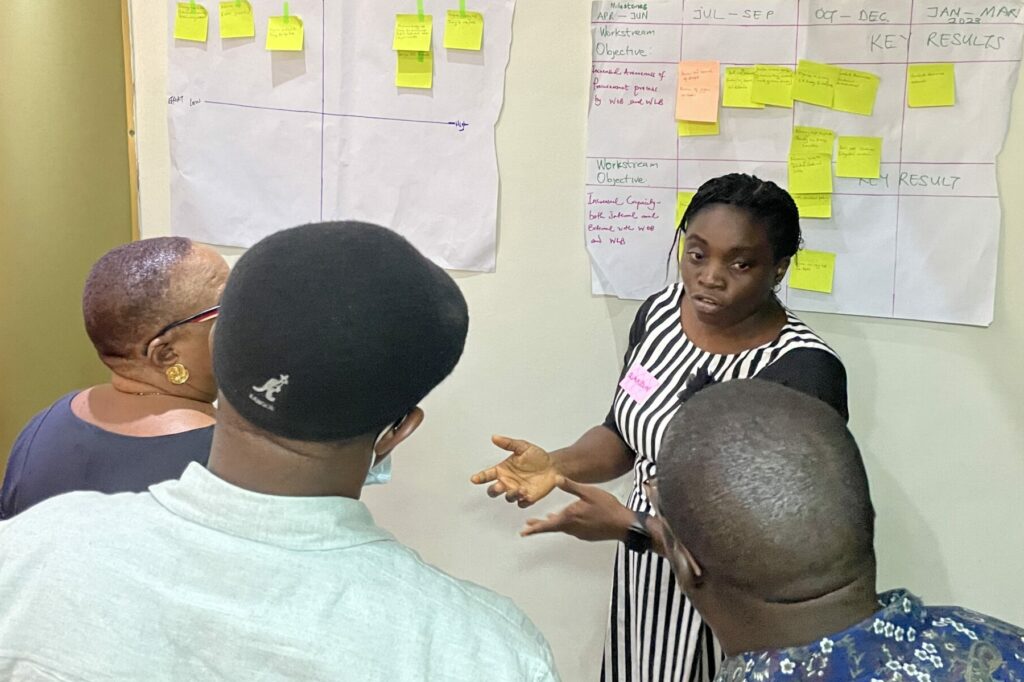
To increase their understanding of the needs of women businesses, they commissioned a survey. They found that of the women-owned or women-led businesses that had worked with the state government in the past, only 15% said they understood the procurement process of Ekiti State, including lacking basic knowledge such as what documents were needed to bid or how the process works.
Survey participants also mentioned that they perceived men as more likely to be favored in the process, so they stayed away. They also cited a lack of financial resources for bidding expenses as another barrier to participation; one woman business owner shared that she had borrowed money to bid three times, but was never successful.
Based on the research, a clear definition of women-owned and women-led businesses has been drawn up, and based around that the Ekiti BPP identified the following key areas of action:
- Increasing awareness of opportunities and creating feedback mechanisms to engage with women-owned or -led businesses.
- Simplifying the process and small business’ capacity to bid for contracts
- Cutting down costs and opportunities for bribe-seeking
- Reducing bias in the evaluation process
- Strengthening regulations to support equal opportunities and fair play
Raising awareness, engagement and feedback mechanisms
One of the key findings of the survey was that women businesses didn’t know about opportunities, and were not yet registered in the public procurement system. EKBPP invested in public communications and outreach to address this focusing on main channels that women in Ekiti would actually use, including radio – preferred by women businesses as one of the main platforms to gather information on opportunities – and flyers. Radio especially helped the procurement agency reach more groups across the state and particularly in rural areas.
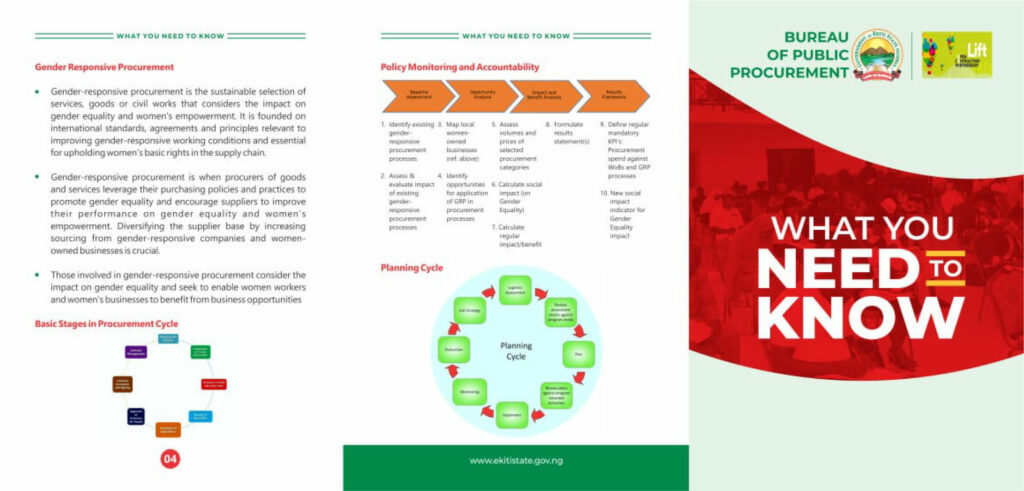
As a result, the registration of women businesses increased by 43% between 2021 and 2022 to a total of 158 businesses.
The Bureau also launched advisory services through representative bodies and a gender helpdesk service at four pilot state government MDAs (Ministries, Departments and Agencies). This has since been expanded to an additional 5 MDAs. The structure is intended to increase responsiveness and make information on public procurement readily available as well as offering a channel to clarify any issues.
Oluwaseun Malomo, senior procurement officer at Ekiti State BPP notes: “We trained procurement officers in buying agencies on best practices to improve the support for women businesses now that they can better identify them and provide advice through the helpdesks. This is about participation. Now they have a dedicated channel to participate, and to make inquiries.”
Ekiti also engaged with local civil society organizations by co-organizing workshops and holding meetings on progress every quarter. Samuel Ogundare, Director of Procurement at EKBPP remembers: “There were some times that they [CSOs] raised issues and the concerns about projects they were monitoring.”
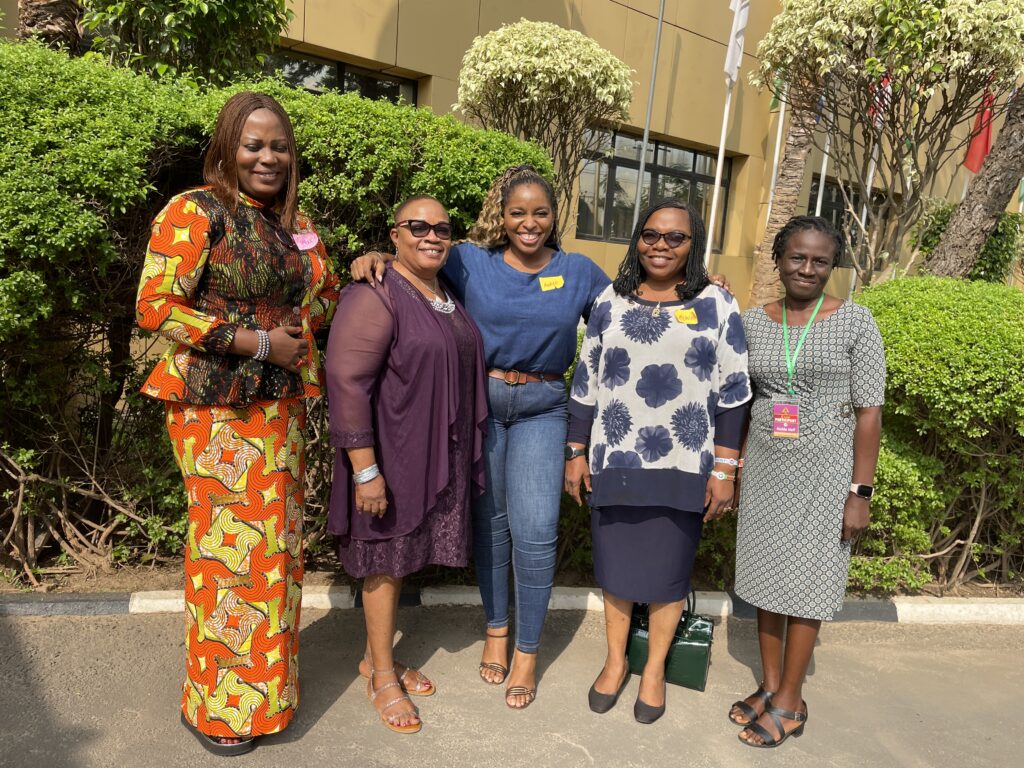
Simplifying the process and building capacity
As part of its review, the agency identified several “conundrums” in its registration procedures and tender requirements. For example, the process required businesses to obtain multiple certificates, stamps, and signatures from various authorities, making it both time-consuming and opening opportunities for bribe-seeking.
The team simplified this process by streamlining and standardizing the documentation needs and only requiring pre-qualification procedures for those documents essential to the work that the businesses would bid for. The agency also eliminated or reduced fees for access to bidding documents, bid security requirements, and bid submissions.
Digitizing supplier registration and bid submission has also helped eliminate barriers to access. “The e-procurement portal has been updated with modules that carry out e-advertisement, e-bidding, e-evaluation, and e-award. Also, we developed a homegrown system that supports our e-registration, and e-certification and recently deployed our e-MDA request module,” says Samuel Ogundare.
The EKBPP also broke up larger contracts into smaller ones that small businesses are more likely to be able to deliver and provided ad-hoc opportunities to train women-led businesses on the process through a newly established helpdesk.
The team have expanded their capacity to manage these updated processes. 16 more procurement officers have been trained and this will be expanded to more officers going forward. In addition, Ekiti’s BPP trained 40 procurement officers in the MDAs participating in the process.
Reducing bias in the evaluation process
One of the key findings of the user research was that women perceived they were discriminated against in the procurement process, particularly in the bid evaluation process.
As a result, more women were included in decision-making capacities, for example, in the technical evaluation sub-committee on procurement. The rules have been changed so that the decision-making quorum in bid evaluations needs to include at least one woman.
Institutionalizing the reform: Strengthening regulations
Finally, in collaboration with OCP’s Lift team, the agency reviewed its public procurement legislation to identify gaps and opportunities to promote the inclusion and participation of women-owned and women-led businesses. This resulted in an updated Procurement Manual ratified by the State Executive Council in May 2023.
Updates to the manual include measures such as legitimizing subcontracting, reducing the registration and tender fees for women-led businesses, creating a quota for women-led businesses in public contracts, and establishing tools to allow for advance payment in some procurements to lower the entry barrier for women businesses – for example using an Insurance Bond for advance payment of contracts for works, services or supply of goods.
The new policy also institutionalizes the gender desk that provides support for women-led businesses and a direct contact person.
The bureau is now in the process of translating the Manual into local dialects to ensure as many people as possible can understand the procurement regulations.
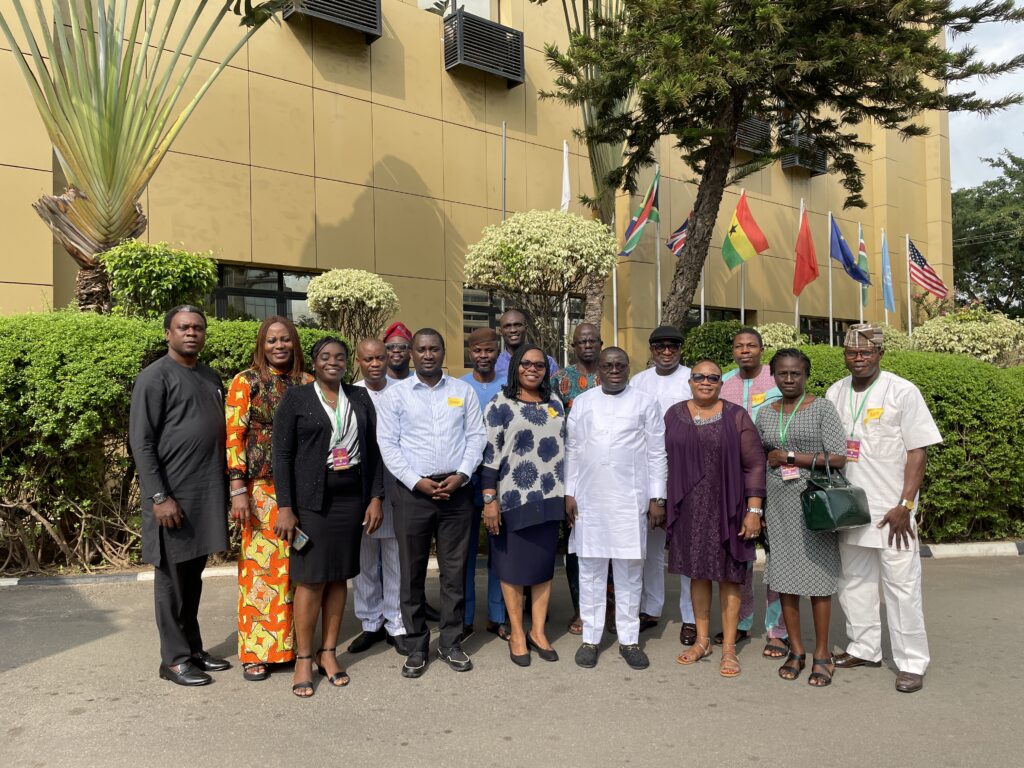
Results
The number of women-led businesses registered in Ekiti State increased by 43% between 2021 and 2022 to a total of 158 businesses, and a total of 21 businesses won a total of 47 contracts in that period, mainly related to the renovation of schools and school furniture. In comparison, only 7 women-led businesses had won contracts in 2020.
Women businesses are now more likely to participate in public procurement, with 30% saying they do so, compared to 23% before, according to a survey by the Ekiti BPP. The bureau says that women-led businesses can now see that small businesses like theirs are bidding on and winning contracts, which should further build trust.
The data and information collected at the beginning of the process were critical to understanding the barriers and delivering the results. But the agency is also aware that this is only the first step, and is working towards improving the data quality and availability in their open data portal.
“While we now have the classification for women businesses, we want to better understand in which business categories they are most active – consultancies, goods, services? And most importantly, to not only classify them but look at the strengths of each of these women businesses,“ says Samuel Ogundare.
“Now that we have more women coming on board, we want to empower them so that they can show their ability and capability to further deliver for the state.”
“Now that we have more women coming on board, we want to empower them so that they can show their ability and capability to further deliver for the state.”